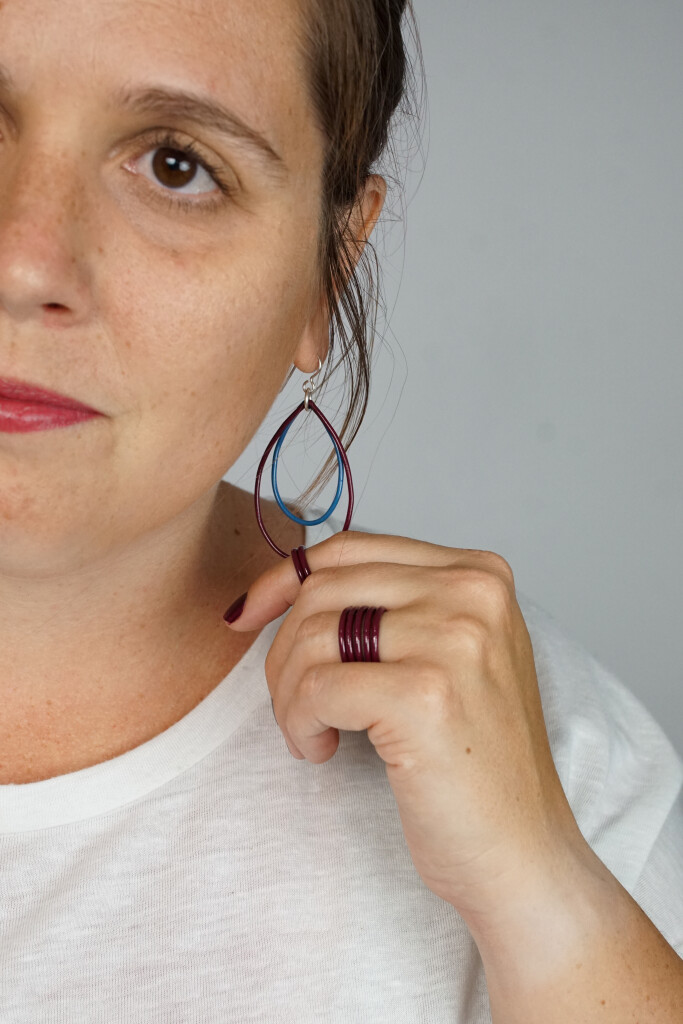
Note: I decided to use this pic of me wearing my burgundy stacking rings as a nod to the burgundy suit Kamala wore to accept the nomination.
I’ll admit it, I hadn’t really taken the time to learn Kamala Harris’ story until this week. I was team Elizabeth Warren during the primaries, and even after Harris was announced as Biden’s running mate, I was too busy luxuriating in my own smugness (I told a friend back in March that she would be Biden’s VP pick) to really take the time to learn about her. I knew the basic sound bites, of course. But at first, I didn’t take the time to dive deeper.
It was only upon realizing that I was following her niece, Meena, on Instagram that I began to dig into Kamala’s story. And the more I learned, the more I recognized the ways in which I see myself reflected in Kamala Harris in ways I have never seen in another political candidate.
Of course, much has been made about Kamala’s identities as a Black and South Asian woman, and rightly so. She represents people that have thus far not been able to see themselves in the positions of leadership that she has held, and the one she is vying to hold now, and that is incredibly valuable and important.
But these are not the only people Kamala represents. For as much as I supported Hillary (and so badly wanted her to win), even as a white woman, I see more of myself in Kamala than I ever did in Hillary.
For starters, like me, Kamala retained her last name after getting married. While the decision to keep my maiden name was natural to me, I’m still amazed at how uncommon this choice remains, particularly in heterosexual marriages. I can’t speak to exactly why Harris made that choice for herself, but to see a woman in this position who kept her own name speaks directly to my own choice.
Kamala also embodies the idea that not having biological children of your own does not preclude you from nurturing, or caring, or loving, or even mothering. Again, I cannot speak to her specific situation, but as someone who is child-free by choice, to see the relationship that Kamala has with her niece, her step-children, and I’m sure countless others younger than her, affirms what I’ve come to realize over the last number of years in my life – that nurturing and mothering happen in many forms, not just in the traditional role of mother, and that they are all necessary and valid.
And finally, Kamala and I share one more thread, one that I wouldn’t wish on anyone, but one that creates a bond with anyone else who’s experienced it. Like Kamala, I lost my mother to cancer. And, as I learned watching her nomination acceptance speech, I too was profoundly shaped by the mother I lost too soon. Kamala understands the pain of your mother not being here to see your greatest achievements unfold. She knows the ways in which every positive moment in your life and the lives of your family members is twinged by the heartache of loss. She knows, and I know this, because I know it too, what it feels like to be profoundly shaped by a woman in a way that leaves a huge mark, but also a huge hole, after that woman is gone.
That Kamala devoted so much of her speech to pay tribute to her mother speaks volumes about who she is and what she values.
Kamala Harris is a woman shaped by her mother who is rewriting the definition of what motherhood looks like.
She is a woman who is committed to family without sacrificing her own identity.
And she is a woman who understands how to channel loss into empathy and how to stand back up after despair.
I know she is not a perfect candidate, because there is no such thing, but too much attention has been paid to her faults, and not enough to her humanity. Too much attention has been paid to her history as a prosecutor, and not enough to her history as a woman, a daughter, an aunt, a step-mother, a person.
Over the last four years, we’ve seen what happens when we elect leaders who understand the political game, but don’t understand what it means to be human. We know what happens when we set humanity aside.
Learning Kamala’s story this week, and seeing the ways in which it reflects my own, is a reminder that if we want our leaders to govern with humanity, we need to look at them as whole humans. Yes, we can still hold them accountable for policy decisions, but we can’t set aside their experiences as real human beings.
Because ultimately, what we need in our leaders is the capacity to care, to listen, to understand, while at the same time, being unafraid to speak out and be who they truly are.
This is a lesson I learned from my own mother, and it’s one I now know Kamala Harris learned from hers as well.




Leave a Reply